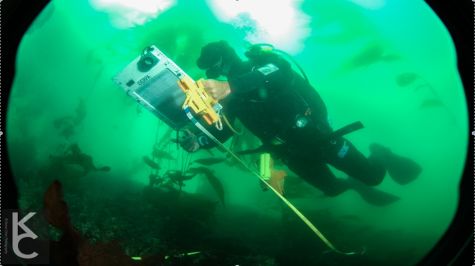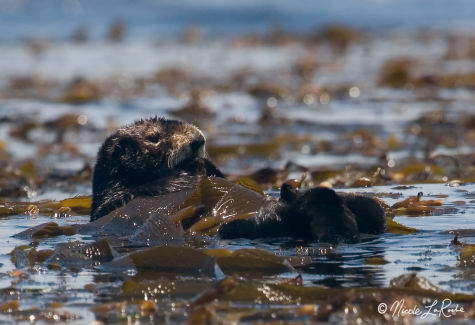Our aim is to contribute to an ongoing study examining how sea otters are able to buffer kelp forests from food web perturbations such as ongoing sea star wasting, and the subsequent record-setting outbreak of sea urchins. Three undergraduate students will receive summer mentorships to conduct sea otter foraging observations and underwater research on predator-prey dynamics, giving them an invaluable introduction to their academic careers and an otter’s eye view of our beloved oceans!
Your support will be going towards undergraduate marine biology students who want to commit their summer to subtidal kelp forest research. All are scientific divers certified through American Academy of Underwater Sciences (AAUS) and have taken the field intensive course Kelp Forest Ecology, where they developed a fundamental understanding of the Monterey Bay subtidal ecosystem. Through this program they have gained an appreciation for subtidal research and wish to continue to study this system in a way that utilizes their unique skillset.

A research diver reeling out the meter tape while performing a fish transect. Photo credit: Kenan Chan
This project is a one-time opportunity, allowing students to commit their entire summer to ongoing research. Receiving funding will allow undergraduates to fully devote their time and energy to field biology that they have not had the opportunity to participate in due to work and school obligations throughout college. For the first time students will get to experience working full-time in the field that they study. They will become trained and participate in observational studies, scuba diving data collection, and laboratory analysis of the data collected, contributing to ongoing research projects. Students will work with graduate students and professors Mark Carr, Tim Tinker, and Pete Raimondi to further understand the many facets of kelp forest ecology. These opportunities to learn and grow as field biologists would be a crucial stepping stone to flourishing as graduate students and paving the way for future pathways of research.
The goal of Partnership for Interdisciplinary Studies of Coastal Oceans (PISCO) studies are to understand the ecological changes and impacts felt by the California coast for the purpose of informing ocean management and policy makers to better protect our oceans. By maintaining strong, well staffed monitoring programs we can observe any changes that may happen in these coastal ecosystems and respond quickly where intermittent studies could miss important fluctuations in coastal ecology. All of this ultimately impacts the strength and diversity of the species found along our coast line; from the smallest rockfish to the largest humpback whales that call our coast home.

An otter (Enhydra lutris) sitting in a bed of kelp (Macrocystis pyrifera). Photo credit: Nicole LaRoche
Otters play a pivotal role in coastal marine ecosystems, acting as a regulating predator for Central California kelp forests; eating urchins which would otherwise overrun and totally consume our coastal kelp forests. However, other examples suggest that disease and disturbance may be more important than predators in suppressing urchin overgrazing. We will employ experiments and surveys to determine whether and how sea otters and sea stars act separately and in combination to control the rapid growth of sea urchin populations that is occurring in concert with a sea star wasting epidemic along the west coast. Working with Dr. Tim Tinker, of the United States Geological Survey (USGS) and UC Santa Cruz, and with biologists from the Monterey Bay Aquarium, we will collect data to understand what our fuzzy friends are eating, and if they are targeting the species which cause the destruction of kelp forests.
advance our understanding of how multiple predators interact to influence community structure, stability and resilience.
shed light on how species interactions contribute to the stability of these forests that are the foundation of productive commercial and recreational fisheries.
share that knowledge so ocean managers and policy makers can take science‐based decisions regarding coastal and marine stewardship
In addition to the research implications, this once-in-a-lifetime experience is critical for undergraduate career development. Support students and your fuzzy ocean friends by making a gift today!
All donations of five dollars or more will receive a written thank you and an invitation to our website to receive updates on our work.
For donations of $150 or more you can choose between a PISCO shirt or baseball cap.
For donations of $300 or more you will receive a PISCO sweatshirt with the PISCO Giant Kelp blade.
A large print photograph of subtidal species taken by a local, talented underwater photographer.
For donations of $750 or more you shall receive a guided tour of the lab, meet some of the professors behind the project, and see the facilities where we prepare for our field days, as well as an apparel item.
If you donate $1000 or more you will be invited to a end of the summer soirée where you can enjoy beer, wine, and scrumptious snacks as we talk about the research we have done over the course of the summer as well as all previous rewards.